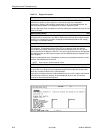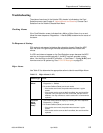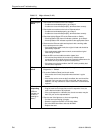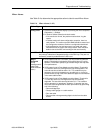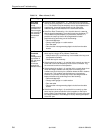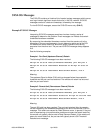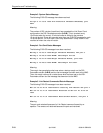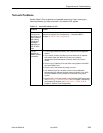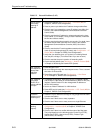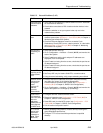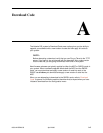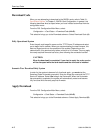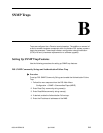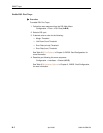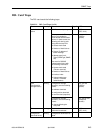
Diagnostics and Troubleshooting
5-12
8000-A2-GB20-50
April 2000
Table 5-5. Network Problems (2 of 3)
Problem Action
Cannot Ping or
Telnet after
entering IP
address.
1. Restart the interface (see Configuration → Interfaces (A-C) in
Chapter 3, RADSL Card Configuration).
2. Reset or power cycle before the IP address changes take effect.
3. Check to see if you entered the correct IP address (see Who Am I
screen in the Hotwire Management Communications Controller
User’s Guide).
4. Check to see that the IP address is unique and matches the class
of the subnet. (For example, if using a Class B address, make sure
the first two numbers match.)
5. Check to see that the subnet mask is set correctly. If in doubt, leave
the default subnet mask (see Who Am I screen in the Hotwire
Management Communications Controller (MCC) Card User’s
Guide).
6. Check to see that the IP next hop address matches that of the
router (if communicating through IP router) (see Configuration → IP
Router (A-E) in Chapter 3, RADSL Card Configuration).
7. Verify that your address, port, or IP protocol is not being filtered
from the port or bridge. (Turn off the filters if you are not sure.)
8. Check to see that the port in question is forwarding traffic.
9. Check received packets (see Monitoring → Network Protocol (B-D)
in Chapter 4, Monitoring the Hotwire DSL System).
DSL cards do
not respond at
startup after
rebooting
chassis.
1. Reset the MCC card.
2. Be sure LEDs go through the reset sequence once. Then, a second
time after 15–20 seconds.
3. Reconfigure each DSL card (see Configuration → Card Status
(A-A) in Chapter 3, RADSL Card Configuration).
DSL cards not
using MCC
Router ID as
source address
for traps.
1. In standard configuration, MCC and DSL are in separate subnets
and Router ID is the same as IP Base Address of MCC’s LAN (e1a)
interface. Set the Router ID to the management IP address on
MCC’s LAN interface.
2. Set this as “Base IP Address” for LAN interface.
3. Reset MCC and all cards (see Configuration → DSL Cards (A-G) in
Chapter 3, RADSL Card Configuration).
Excessive
collisions on an
Ethernet port.
1. Determine if your network is too large or long (single Ethernet cable
or end-to-end cable).
2. Check to see if there are too many repeaters.
3. Check to see if there are too many users on a single Ethernet.
Filters are not
working
properly.
1. Check to see that filters have been configured properly (see
Configuration → Interfaces (A-C) in Chapter 3, RADSL Card
Configuration).
2. Check to see if there is a conflict with the order of the filter tests.
They should perform in the following order: Port-to-Port (PTOP),
Host-to-Port (HTOP), Host-to-Host (HTOH), Protocol Type
(PROTOCOL), Bit Filtering.



